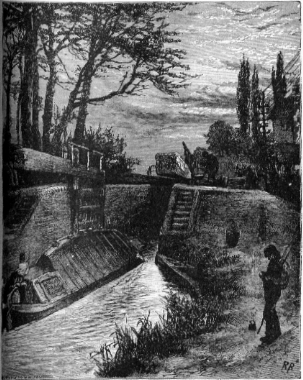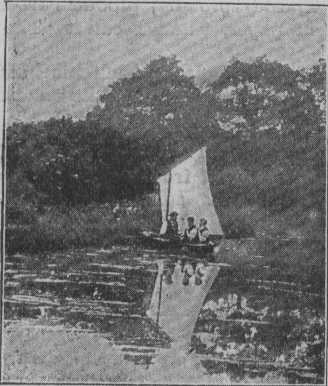Accordingly, I took a friend (who had been my boon companion on many a previous trip by land and water) into my confidence, and after due deliberations, befitting an enterprise likely to be of a novel character, we determined to explore the comparatively un-known canals that commence from the Thames, at Brentford, and thread their way through England from south to north, and end at Kendal in Westmorland.
One thing that largely influenced us in deciding upon this route was that we had recently become possessed of a light and well-built Canadian canoe that had been sent us by an English resident in France, where he had been using it in exploring the picturesque portions of the Seine.
We fortunately had a friend connected with the Grand Junction Canal Company, and through his kindly offices were enabled without much difficulty to obtain passes allowing us to journey over the different canals which we had mapped out as the waterway to follow.
This part of the undertaking having been successfully disposed of, we turned to and overhauled our craft, and saw to the getting of the outfit which we should require in order to make the trip a success.
By the time that all our arrangements were in a complete state, the day fixed for the start arrived, and it found us brimming over with cheerful anticipation of the good time in store for us during the next three weeks, and in the best of health and spirits.
We were "up betimes in the morning," as quaint old Samuel Pepys has it, and journeying down to the boat-house at Kew, where we had left our canoe overnight, soon got afloat and on our way, without mishap or delay of any kind. What a glorious August day it was! The sun shining brightly in a cloudless blue sky overhead, the birds singing blithely in the trees upon the banks, and the water sparkling and lapping beneath our bows; no wonder we took it all as a good omen for the success of our trip.
Heading up-stream, we soon shot beneath the railway bridge at Kew, and pass through dirty, straggling old Brentford, entered the Brent, where a short paddle brought us to the first lock. Getting through in our turn, after a short delay caused by a string of canal barges coming through to catch the morning tide, we entered upon the Grand Junction Canal, which extends form here to Braunston, a distance of some hundred and six miles.
An enjoyable paddle through fairly pretty and diversified scenery brought us to Hanwell, where we had to negotiate a cluster of five or six locks, all grouped together within a short distance, for the purpose of carrying the water over a sharp rise in the ground. We had a brief chat here with an old bargee, from whom we got some useful advice, not wholly free from chaff, and proceeded upon our way, arriving about midday at West Drayton, where an al fresco lunch on the bar was much appreciated. Resuming our journey after refreshing the inner man, we passed Uxbridge and Harefield, and so out of Middlesex into Hertfordshire.
The town of Rickmansworth being passed, Watford, about a mile from the canal, was settled upon as our first stopping place; and evening approaching, we went ashore to seek our well-earned repose for the night.
Early to bed and early to rise was the programme, so after a light supper and a brief stroll around the outskirts of the town, we turned into bed and were not long in seeking the sleep that is said to be the reward of an easy conscience.
The sun shining through our window in the morning got us out of bed at an early hour, and we were soon splashing about in the sunlit waters of the canal. A delightful dip ended, we returned to our quarters for breakfast, and from the looks of genuine admiration expressed upon the countenance of our landlady, I should judge that our appetites did us full credit.
Afloat once more, we paddled by easy stages past Cassiobury House, surrounded by a glorious well-wooded park, and then reached King's Langley, to which an interest attached as having been the birthplace of Edward III.
We found the scenery all along this portion of the canal typical of rural England, the various inns by the wayside recalling the delightful types made familiar by the brushes of Dendy Sadler and Yeend King.
We soon found to our cost that the tropical summer weather was responsible for the presence of numerous wasps, whose attentions were rather too pressing to be altogether pleasant. While engaged in trying to allay the burning pains of a bad sting upon Jacky's arm, we were advised by a rustic on the bank (whose sympathetic grins upset my chum almost as much as the wasps) to try some clay from the canal-side as a remedy. We were sceptical at first, but were subsequently astonished at the soothing effects of this novel panacea for wasp-stings. Here is a wrinkle for any of my readers who should happen to get stung by the ferocious little pests.
At Boxmoor, where we next arrived, we observed, during a saunter around the village, a curious stone erected to the memory of a highwayman rejoicing in the most un-romantic name of Snooks, who was hanged here at the beginning of the century for robbing the King's mail.
Paddling on farther, we passed Berkhampstead (a corruption of Berg-ham-sted, the home on the hill), with its picturesque castle, much in request by picnic parties, and duly arrived at Bulborn, near Tring, and during a stroll around the latter town we observed a column erect to commemorate the completion (in 1832) of the canal along which we were journeying.
We stopped for the night at Bulborn, a typical bargee's village, and after our usual morning dip proceeded on our way in good time.
As the day wore on, we got well into Buckinghamshire, and shortly after came to Stony Stratford, remarkable in history as being the place where the ill-fated young Edward V was seized by Richard Duke of Gloucester.
A paddle of some length brought us to the Stoke entrance of the well-known Blisworth Tunnel, which is a mile and a-half in length, and forms the first of a series along the route.
Seeing one of the curious little tug-boats about to proceed through the tunnel, we obtained permission from one of the very grimy crew to place our canoe aboard, and, this safely accomplished, the tug puffed and snorted up to the entrance, hitched on to a string of barges, and with a deal of fuss and smoke entered the tunnel.
The journey through this subterranean passage was a most novel one to us who had never been through a tunnel of this description before. The intense darkness, only illuminated by the light from the boiler fire, was most uncanny, while the wonderful reverberations and echoes occurring in the tunnel quite startled us until we became used to the situation. The roof seemed so low that we instinctively stooped our heads to avoid getting them removed from our shoulders, an action which caused immense amusement to the skipper, who, in the manner of his kind, accentuated the eerie feeling of the place by spinning all sorts of creepy yarns about canal boatmen who had mysteriously gone overboard in the pitch dark, and never been seen again.
We drew a long breath when we emerged into the welcome blinking daylight at the other end of the tunnel, and soon after bade good-bye to our whilom friend the skipper.
I can imagine no place more calculated to quickly shatter the nerves and break the health of a human being than one of those foul, suffocating tunnels under the hills.
On this occasion we stopped for the night at Blisworth and put up at a wayside inn possessing the curious sign of the "Sun, Moon, and Seven Stars" (the only one in England we were told), where we met with quite a reception, the news of our approach having gone ahead of us, we afterwards discovered.
Before proceeding next day, we had to clear the canoe of the dirt and rubbish collected during the passage of the tunnel. Upon this day we passed through six locks in close succession, as well as another tunnel, and skirted the village of Ansley, once the property of Lady Godiva, of the uncomfortable ride fame, soon after which we left the waters of the Grand Junction at Braunston (Warwickshire), and entered upon those of the Oxford Canal.
A hard day's paddle, of no particular interest, brought us to Willoughby, where we put up for the night.
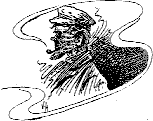
A Monkey-Barge Man.
We awoke next morning to find the weather damp and misty, so we dispensed, for the first time, with our morning dip, and lingered somewhat over breakfast to make up for it.
A propose of eating, I should mention that all along the way we had come fruit was in abundance,
and as for apples--well, we fairly revelled in them.
To my mind a good English apple, fresh picked from the tree, and with the dew upon its sun-kissed cheeks, cannot be beaten the whole world over.
During a portion of this day we had to face a strong head-wind, which made the travelling rather hard, and severely taxed the patience and skill of the steerer. Happening to chaff him once or twice when the wind got the upper hand and nearly slewed the canoe round, he challenged me to try my hand and do better. Accepting the challenge, and in the rashness of youthful confidence,
I ventured to wager him that I could take the canoe, single-handed and empty, up to a certain point and back again, during which I should, of course, have to turn broadside on to the full force of the wind.
The outcome of it was that we quickly landed and emptied the canoe of all impedimenta in case of mishap, and then I started off--not so confidently, though, I may add--on my uncertain way.
All went well until I attempted to turn, and then the
full force of the wind catching me suddenly, over I went, after a vain attempt
to steady the canoe, souse into the canal. Coming to the surface, I called out
(when I had emptied my mouth of as much canal-water as I could) to Jacky that I
was all right, and then, amid his uproarious mirth, I struck out for shore,
pushing the canoe in front of me.
A brisk rub down and a
change of flannels (we were in a secluded spot, fortunately) soon mended
matters, and by the time Jacky had emptied the canoe of water and stowed away
our belongings, I was ready to start again, thoroughly cured for the time being
of over-confidence in my canoeing powers.
After a stiff
paddle through charming woodland scenery, and passing en route Bedworth,
the most active part of the Warwickshire coal-fields, we reached Nuneaton, where
we went ashore and engaged a room for the night under the hospitable roof of the
White Horse.
A stroll around Nuneaton before bedtime
afforded us much delight, as the old town is full of antiquity, and is also
known to fame as the birthplace of George Eliot.
In the morning we took mine host's little son and daughter with us in the canoe as far
as Atherston, where we sent them safely back by train, thoroughly delighted with
their novel experience, ours being the only craft of the kind that they had ever
seen in those parts.
When we arrived at Caldecote we went ashore to explore the place, and noticed with much interest a monument erected
to the memory of one George Abbott, who in days gone by defended Caldecote Hall
against a Royalist attack led by Prince Rupert. So stubborn was the defence that
the defenders melted down the pewter dishes and plate to cast bullets.
We noted with pleasure that the lives of those
gallant Roundheads were spared when the garrison finally had to surrender.
We proceeded on through the Birmingham Canal,
passing close by Coventry, and arrived at Fradley, where we obtained a charming
view of Lichfleld Cathedral in the distance. We rested for the night at Fradley
(our bill for an excellent supper, bed, and breakfast coming to the modest sum
of 3s. 6d. for the two of us), and early next morning got
afloat.
We were now on the North Staffordshire Canal,
having covered about 160 miles since the commencement of our journey.
We shortly after began to get in the heart of the
Pottery District, and the scenery for some distance assumed the aspect peculiar
to manufacturing centres.
Past Armitage, Rugeley, Colwich, and several other
towns and villages we paddled, until we reached Little Heyward, where we stopped
about midday for lunch.
Re-starting after a rest,
we were overtaken by a monkey-barge, the skipper of which kindly gave us a tow for some miles, until we arrived, in the afternoon, at Stone, where we went ashore for tea and a look round the town. On several occasions we took advantage of the good-nature of the bargees and their wives, and obtained a tow behind their barges when we wanted a rest. On the whole, we found them a most interesting and sociable lot of people, and on more than one occasion we were invited on board, as honoured guests, to partake of tea with the skipper and his family.
Life on board one of these slow-moving canal barges appeared to me to possess many
charms. The barge people seem to pass a sort of amphibious existence, belonging
neither to the land nor to the water, but having a human interest in each.
The women and children almost wholly live aboard their floating homes, often never
stepping ashore from one day to the other and going about their domestic duties,
as well as those connected with their calling, with all the precision and
cheerfulness in the world, as if there were nothing strange or out-of-the-way in
their surroundings.
Then the scenery through which they pass. To anyone who is capable of appreciating the beauties of Nature in the slightest degree, there must be something soothing and elevating in constantly being brought face to face with Nature in all her varying charms. Now gliding calmly past a water-side village, with the children running out to give you a greeting; then through a
waving, poppy-starred cornfield, or past low-lying meadows, with the meditative
cattle standing knee-deep in the sweet pasturage, and anon a bend in the canal
carries you past wood-lands where the trees meet overhead and form a cool canopy
through which the rays of the sun can only penetrate here and there in slanting beams.
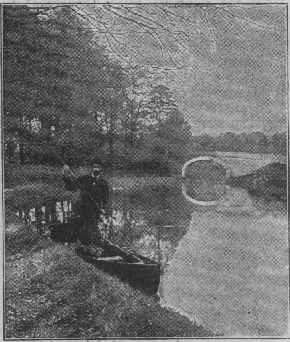
Scene at Natland Beck.
[photo by A. S. Walker.
When my thoughts wander in this groove,
I often marvel at people electing to live in stuffy, smoky towns, when the charms of the
country are at their bidding.
Proceeding on our journey after tea, we
eventually arrived at Stoke-on-Trent, and went ashore to seek shelter for the
night at a wayside cottage.
We got afloat in the morning
after our swim and a hearty breakfast, and proceeded past the outskirts of the
town, which we were not sorry to leave behind.
It came on to rain soon after
we left Stoke-on-Treat; but as we were well prepared with macintoshes to face
the elements, we proceeded cheerily on our way.
After paddling for about four miles we came to the entrance of another long tunnel,
which we entered, after taking the precaution to provide ourselves with candles.
We had a nasty experience in navigating through this tunnel, which I should not
much care to encounter again.
After proceeding
cautiously for some distance, during which we had to avoid a ducking, and possibly a
swamping, from the numerous "weep-holes" that let showers of land water descend
from the roof, our candle suddenly went out and left us in total darkness. To
make matters worse, a lot of land-water was coming through the tunnel, which,
together with the backwash of a tug some little way ahead of us, tried us
considerably, and finally wedged our canoe between the two walls of the
tunnel.
We did not relish the situation at all, I can
assure you, especially as we could not take stock of our whereabouts; but after
a deal of rocking and shoving (during which we had a narrow escape from
capsizing), we managed to get the canoe clear of the walls, and worked our way
backwards, hand-over-hand, to the mouth of the tunnel.
After this experience we were strangely unanimous as to the desirability of
going through in some less risky manner (we accused each other of "funking"
afterwards), and accordingly sought the aid of a man, a boy, and a wheelbarrow,
and in this unconventional manner conveyed our goods and chattels overland to
the other end of the tunnel.
In the course of our journey
along the canals we passed through a number of these tunnels, including the one
that starts close to Chatterby Station, and goes under Yield and Golden Hills.
The passage of barges through some of these tunnels is performed in a very
curious manner, as owing to the roofs being too low to admit of tugs passing
through, the heavily laden canal barges have to be "footed" along by men and
boys lying on their backs and pushing against the roof or walls of the tunnel.
As may be imagined, but slow progress is made in
this manner, the passage of some of the tunnels occupying upwards of an hour.
In some cases, however, the tunnels are provided with a narrow tow-path running
through them, which, of course, greatly facilitates the passage, as when once
momentum is obtained, a man and a boy can tow a barge through without much difficulty.
We next reached Harecastle, in Cheshire,
where we landed for lunch. Re-starting, after doing justice to a good feed, we soon
encountered a cluster of thirty-five locks (think of it) all grouped together
within a distance of six miles. Finding the negotiating of two or three a
weariness of the flesh, we cast around for help, and fortunately came across a
"locked-out" coal-miner, who for two shillings cheerfully trotted on ahead, and
opened each of the remaining locks ready for us by the time we arrived, thus
giving us a welcome rest after a spell of hard work.
After getting through the locks we had a straight-away paddle of some nine miles,
which was a pleasant change after the slow and tedious progress we had lately
been making, and passing by Alleyfield and Sandbach Station, brought our day's
journey to an end at Middlewich, where we are glad to leave the canoe at the
lock-house, and make preparations for passing the night.
Proceeding next morning, with the sun shining and everything looking fresh and
lovely after the rain of the previous day, we got into the picturesque, country
peculiar to the salt district.
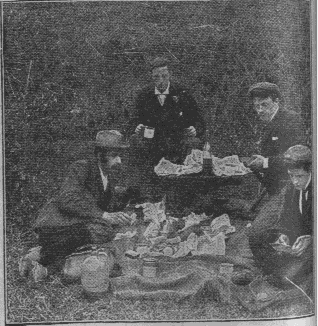
A Tea-party near Sedgwick.
[photo by A. S. Walker.
Some distance out of the town we obtained a pleasant tow of a few miles behind a barge going in our direction, and from an
old lady in a picturesque sun-bonnet; who came out of the cabin to chat with us,
we got the welcome information that we should pass through a wonderful nut-grove
on the banks of the canal, where she prophesied that we should have a real royal
time. And she was about right!
Such a profusion of
filberts I never have seen before. The trees literally were interlaced across
the canal, and being in a perfectly out-of-the-way spot, where scarcely anyone
but the canal-boat people passed, the branches were simply weighed down with the
toothsome nuts.
We were told by our informant that the
filberts were anybody's property; so when we came to where the trees were
heaviest laden we paddled beneath the bough and soon had picked enough to fill
the bows of the canoe. You may be sure we never wanted for filberts upon the
rest of the day's journey.
I pictured with what delight
the average schoolboy would have hailed that nut-grove, especially as the
gathering of the nuts from the bank would have entailed torn clothes, many
tumbles, and unlimited scratches.
After passing through
lovely country, we arrived at Preston Brook, where we joined the Duke of
Bridgewater Canal (now the property of the Manchester Ship Canal Company).
Here we decided to stop for tea, after which we once more proceeded
on our way, and after an uneventful paddle, brought our day's journey to a close
at Grappenhall, where we obtained comfortable quarters for the night at a
cottage on the canal side.
Up at six-thirty next morning,
and after cleaning out the canoe and indulging in our morning swim, sat down to
a good breakfast, to which we did ample justice.
Once more afloat, we made
good progress towards Manchester, but after about an hour's paddle it came on to
rain in torrents, and continued so until we reached Cottonopois, which we
fetched at about one o'clock. I have always been given to understand that it
does little else but rain at Manchester, and certainly on this occasion the
much-maligned city did not belie its reputation.
However, we did not trouble ourselves much, about the rain, as we had mackintoshes and sou'-westers on.
Presenting much the appearance of a pair of ancient mariners in our get-up, we entered Hulme dockyard, safely berthed our canoe there, and prepared to spend the next two days with friends in the city.
After passing two very pleasant days, during which we saw all that
could be seen during such a brief stay, we said good-bye to our hospitable
Manchester friends and pushed on towards our destination and in due time reached
Booth Town, close to Barton moss, passing en route Old Trafford Park.
Near by here we arrived at the famous swivel bridge by which the Bridgewater
Canal is carried over the Manchester Ship Canal.
We happened to get to this point just as the bridge was opened to traffic for the
first time, and as we paddled across in state we were hailed and told that ours
was the very first canoe to have the distinction of crossing the new waterway.
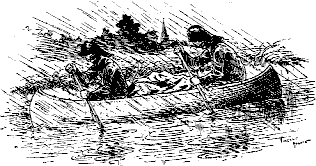
Approaching Manchester in the rain.
During the rest of the day's paddle we were in the very heart of the coal-mining district, and our progress caused no little comment and wonder to the crowds of "locked-out" miners and their families. So embarrassing became their attentions at length that we had to abandon our original intention of landing at Wigan, owing to the numerous crowd awaiting our approach at that place.
Twice we essayed to get ashore,
but finally, not appreciating the appearance of the motley crowd, we pushed on
until we reached Plank Lane, where, the crowd of idlers being a little less
dense, we summoned up pluck enough to venture shore.
Even here we found ourselves the centre of attraction to the people; rough miners
crowding around as we lifted our canoe from the water, to stare in amazement at
our appearance, some even going so far in their admiration of our little craft
as to pass their hands along its polished sides, all the while expressing their
opinions in such a broad vernacular as to be almost unintelligible to our Southern ears. They thought it was a joke upon our part when we told them that
we had paddled all the way from London in the canoe. The way they nudged each
other and winked solemnly was most expressive.
Their attentions at last became so overwhelming that we were compelled to give the
craft into the care of the friendly lock-keeper and beat a hasty retreat.
Our host at Leigh very kindly afforded us a
much-wished-for opportunity of exploring a coal-mine. Getting up early in the
morning, we proceeded to the mouth of the pit, entered the cage, and soon were
speeding downward at a most alarming pace, accomplishing the distance of 700
yards in forty-five seconds.
The sensation accompanying
this rapid descent into the bowels of the earth was far from pleasant, but we
quickly recovered when we reached terra firma, and, when we had become
accustomed to the intense darkness, were soon able to follow our guide through
the almost deserted workings.
The miners were on strike, and only the engineers and others necessary to attend to the machinery for
keeping the shafts and workings ventilated and free from water were on duty, so
that the desolate stillness of the place impressed us more profoundly, perhaps,
than if we had been surrounded by busy toilers.
After going all over the mine, each with Davy lamp in hand--during which we had several
times to chase our head-gear, which was blown off by the strong draught from the
ventilating fans--we once more entered the cage and were quickly whirled upwards
to the light of day.
Next day we embarked rather later
than was our usual custom, and paddled on towards Preston, having to traverse a
portion of the river Ribble before we reached this town. Nothing very
interesting or exciting occurred upon this day, except for a rather narrow shave
we had of getting smashed up by a barge.
It happened that one of us was towing, while the other remained in the canoe to steer. Just as we got to a very narrow strip of the canal near the entrance to a lock, we met some barges coming down in tow of a tug, and, as luck would have it, our tow-line fouled a tree stump just at the moment when the tail barge began to swing ominously over towards our
bank.
For a moment or two it looked as if the canoe must
be crushed like an egg-shell between the bank and the barge, but fortunately at
the critical moment an extra strong jerk on the tow-line got it clear, and with
a run Jacky whisked the canoe through the narrow streak of open water, and we
were safe.
We stayed with friends at Preston for the next
three days, and managed to put in a highly enjoyable round of sight-seeing,
during which we paid a flying visit to Southport.
Our stay at an end, we
embarked once more, taking three of our friends with us in the canoe as far as
Garstang.
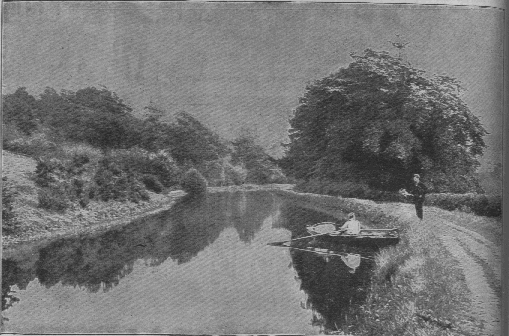
Canal near Sedgwick.
[photo by J. Sawyers, Kendal.
Five people (in addition to luggage) in a small
craft of this description was an exceedingly tight pack, and we had to strictly
taboo any skylarking, else we should very quickly have got a ducking.
At Garstang we left our friends, after a high tea; and after passing several towns
and villages, at eventide reached Lancaster, which we made our headquarters for
the night.
I may mention that we met with great kindness
and consideration from the officials during the whole of our journey along the
Lancaster canal, one of the employés being told off to clear all barges out of
our way, and see us safely, and with the least trouble to ourselves, to its end
at Kendal; this thoughtfulness saving us much delay and inconvenience, and
rendering this portion of our trip one of the most delightful experiences
throughout the whole of our journey.
Getting afloat in
good time next morning, we bade farewell to Lancaster, and pushed on towards
Crooklands, passing Nately and Ashton on the way.
For a great portion of this
part of our journey the surroundings were truly beautiful, the trees meeting
overheard in many places, and forming a cool leafy canopy, while the water was
so clear that we could distinguish objects lying upon the bottom quite
distinctly, although the water averaged a depth of seven or eight feet. Our
silent approach allowed us to come upon shoals of fish, which only darted away
when our bows cleared the water immediately above them, a sight that roused all
our angling instincts.
At other spots along the canal the
towering hills, with their crests enshrouded in mist, combined to make up as
impressive a picture as can be conjured up by the imagination.
Wild-flowers, blackberries, and sloes dotted
the banks in profusion, and the occasional starting of a hare or the putting up
of a rocketing pheasant from out of the woods, through which we passed at
intervals conveyed to us a charming impression of Nature in all the glorious
wealth of an early English autumn.
At Hest Bank the canal
approached the coast, which we followed for some distance allowing us to obtain
an interesting view of Morecambe Bay.
Arriving at
Crooklands about seven in the evening, we left our canoe in charge there and
walked into Milnethorpe, a distance of some three miles, and sought shelter for
the night, with the consciousness that next day would see us at the end of our
canal journey.
Early next morning we are out and about
and, breakfast despatched, we get afloat once more, with the sun shining, the
birds singing, and a soft wind blowing from the south, making the last part of
our trip every respect.
We paddled along past the varied
scenery on the banks, dotted here and there with villages and hamlets and
occasionally a town. The last day on the canal we made a regular picnic of,
landing on the grassy banks when we wanted to rest and eat, and pushing onward
again when we were so inclined.
In this manner we progressed past Hincaster, Sedgwick, and Natland, and at about three o'clock in the afternoon reached Kendal, where the canal system curiously ends in a sheer wall. We were now practically of our destination, and after carefully bumping the nose of the canoe against the headwall of the canal, we landed at the steps.
Obtaining the assistance of a man with a horse and
cart, we conveyed our craft to Kendal railway station, and after tea took the
train (with the canoe stowed away in the guard's brake) to Windermere station.
Now a difficulty arose as to how to get the canoe safely to Bowness-on-Windermere,
a distance of about a mile and a-half. We were nearly at
our wits' ends for want of a suitable conveyance, when a kindly disposed
'bus-driver offered to take the canoe inside the 'bus, which offer, needless to
say, we literally jumped at; and seated outside with our craft stowed away
inside the vehicle, we proceeded to our journey's end in this novel fashion,
much to the amusement and edification of the numerous onlookers.
After a short stay by the lakeside, we took our
canoe by train back to London, and so brought to a close one of the most
health-giving and enjoyable holidays it has ever been my lot to spend,
and which I shall always recall with the liveliest feelings of delight.
